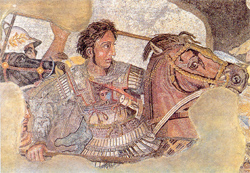You might think a 2,300-year-old sex scandal would eventually lose some of its bite. But when it comes to paragons of masculinity such as world conqueror Alexander the Great, it doesn’t. With his 2004 film Alexander, writer-director Oliver Stone outraged stiff-necked military types with his depiction of the macho Macedonian king, history’s most brilliant warrior, flirting with his boyfriends up and down the Khyber Pass. In between gore-splattered battles, Alexander (played by Colin Farrell) flounces about in makeup at drunken Babylonian banquets, shoots suggestive glances to his male entourage, and indulges in a passionate kiss with one of his officers — all the sort of behavior that would be frowned upon in the U.S. military today, for example. But according to Paul Cartledge, professor of Classics at Cambridge University, the film is actually very coy about Alexander’s busy homoerotic life: There is no real doubt that he took a young Persian eunuch named Bagoas as his lover in Babylon, and that at the height of his power he was still carrying on a torrid affair with his studly childhood sweetheart, Hephestaion. On the other hand, we also know that Alexander sired at least one son — with his wife, the lovely Afghani princess Roxanne — and that he maintained a bevy of voluptuous mistresses as he stormed his way across the Middle East.
So was Alexander bisexual? In fact, the Greeks themselves would not have understood the question. They were shocked by Alexander’s love life for other reasons.
In ancient times, as we have seen, there were no separate categories for “homosexual,” “bisexual,” or “heterosexual.” All men were expected to marry one woman and have children for the good of society, but this was a dull, business-like arrangement; husbands would not even kiss their wives in public. When they were feeling romantic, they would head to the gymnasiums and fall passionately in love with downy-cheeked boys, emulating the randy gods and heroes of Greek myths. (Even the ultimate he-man Hercules went through dozens of boyfriends and enjoyed a phase as a cross-dresser). “Men were not castigated for sex with other men,” says Cartledge, “as long as it was done at the right time, in the right way, in the right place, and with the right person.” Grown men could have their way with adolescent boys up to the age of 16 or so; it was even part of a Greek boy’s education, as the older lovers would “mentor” them in the finer aspects of art and philosophy, while their fathers looked on with approval. But adults had to keep their hands off other grown men. The question of who was the active and who the passive partner was crucial; the older, socially superior male could give but not receive.
For the Greeks, the real scandal about Alexander’s passion for the Persian boy Bagoas was that he was a barbarian and a eunuch — and thus barely human, in their eyes. Also shocking for the day was Alexander’s ongoing romance with Hephestaion once he had become an adult; if it ever came out that the king was the passive partner, he would be the object of mockery and contempt. Nobody has posted an opinion on this, but it appears that Alexander’s fantastic achievements in the battlefield allowed him to flout convention. Still, the pressure might have increased his severe drinking problem: Alexander’s vast wine consumption is blamed for his untimely death at the age of 32.
SOURCE/FURTHER READING: Aldrich, Robert (ed.), Gay Life and Culture: A World History (New York, 2006); Cartledge, Paul, Alexander the Great, (New York, 2004).
Footnote: Pagan Beauty Pageants
A little lower on the list of ancient Greece’s earth-shattering innovations is the beauty contest. These competitions were held at religious and athletic festivals, and usually involved teenage boys — the ideal of Greek beauty being a godlike adolescent “before the down appears on his cheeks.” In a typical event in honor of the goddess Athena in the town of Elis, points were given to contestants for looks, manliness, and strength; the three winners were crowned with myrtle wreaths and would lead a procession to Athena’s temple for a religious sacrifice. Although the beauty contests were rarer for unmarried girls, there are records of them in Sparta, Tenedos, and Lesbos. Because the misogynistic Greeks thought contests based on female beauty might encourage girls to vanity and wanton behavior, they were also judged on other, more socially acceptable attributes such as self-control, discretion, modesty, and oikonomia — good management of the household.
SOURCE/FURTHER READING: Johnson, Marguerite and Ryan, Terry, Sexuality in Greek and Roman Society and Literature: A Sourcebook, New York, 2005.




